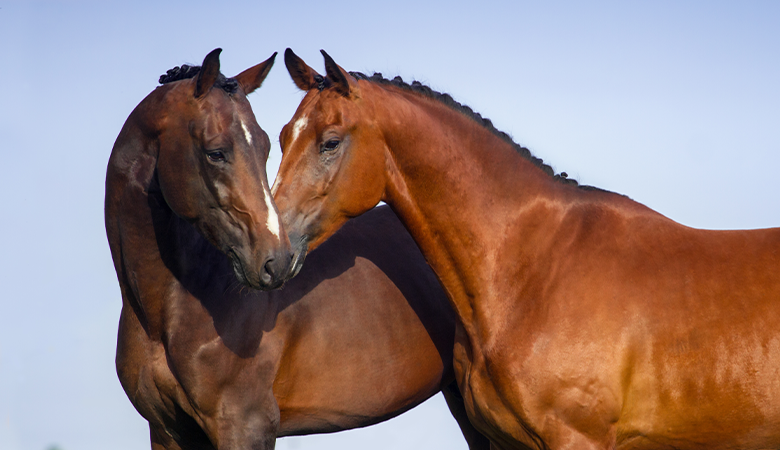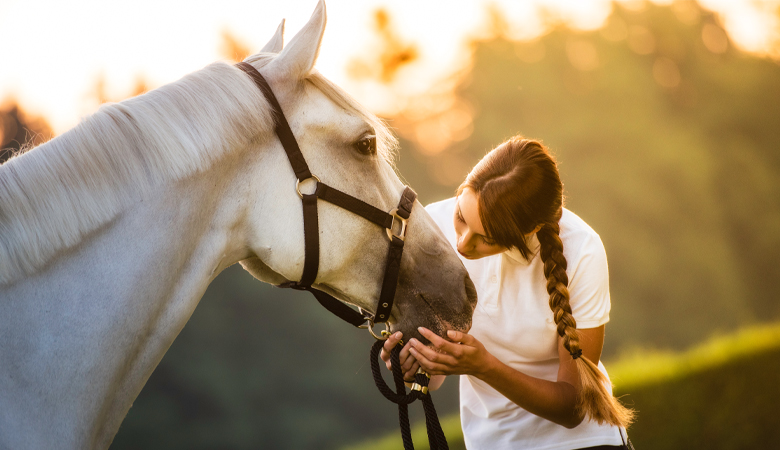Gastric ulcers in horses
Gastric ulcers are more common than many people think, especially in sport horses, young horses and horses that experience stress or receive irregular feeding. They occur when stomach acid damages the stomach lining.
Symptoms of a gastric ulcer in a horse
A horse with a gastric ulcer may show various symptoms:
- Poor appetite or eating slowly
- Weight loss despite adequate nutrition
- Yawning, teeth grinding or licking
- Sensitivity when tightening the girth or brushing
- Colic-like signs after feeding
How do I know if my horse has a gastric ulcer?
The diagnosis is usually made by gastroscopy, an endoscopic examination of the stomach. Only this allows the exact location and severity of the ulcer to be determined.
How is a gastric ulcer treated?
Treatment usually consists of stomach acid inhibitors, such as omeprazole, and management changes: more roughage, less stress and feeds with a buffering effect.
In addition, supportive supplements can be used, such as:
Colic in horses
Colic is a collective term for abdominal pain in horses and can range from mild to life-threatening. It can be caused by gas accumulation, impaction, worm infections or twisting of the intestines.
Symptoms of colic in horses
Horses with colic may show different symptoms, such as:
- Pawing with a front leg
- Looking at the abdomen or flanks
- Flehmen response, rolling or lying down
- Sweating and restless behaviour
- No manure or changes in the manure
How is colic diagnosed?
The vet will carry out a physical examination, listen to the intestinal sounds, perform a rectal examination and may pass a stomach tube to assess the stomach contents.
How is colic treated?
Treatment of a horse with colic depends on the underlying cause. Colic is often treated with painkillers, antispasmodics, laxatives or, in severe cases, surgery.
Supportive supplements can help the treatment, such as:
Also read our blog: Colic in horses.
Fecal water in horses
Fecal water, also called watery feces or fecal liquid, is a common problem in which water passes separately from the manure from the rectum. The horse loses a lot of fluid this way, which is unpleasant for the skin, the tail and stable hygiene.
What are the symptoms of a horse with fecal water?
A horse with fecal water has normal, formed manure but also a watery discharge. This leads to:
- Dirt on the tail and hindquarters
- Irritated skin or tail rubbing
- No fever or severe colic, but clear intestinal discomfort
What are the causes of fecal water?
The cause of fecal water is not always clear. Possible factors include:
- Feed changes
- Stress or hierarchy issues
- Too little structure or roughage in the diet
- Reduced intestinal flora quality
How can fecal water in horses be treated?
A good feeding regime, sufficient roughage and calm in the gastrointestinal function are crucial. Sometimes it helps to limit starchy or sugary feeds.
Supplements can also be used to support horses with fecal water, such as:
- Puur Digest: supports a healthy intestinal flora and digestion.
- Phytonics Micro Comp: helps to optimise the intestinal flora.
- NAF Gastri Aid: supports a sensitive digestive system and contributes to both a normal acidity in the stomach and good intestinal function.
Digestive problems in horses are not always visible on the outside but can have a major impact on their wellbeing. By paying attention to signs such as reduced appetite, changes in behaviour, abdominal pain or abnormal manure, you can often identify problems at an early stage. Supplements can provide valuable support but do not replace veterinary treatment in acute cases.
Do you have questions about the right support for digestive problems in your horse? Please contact us at veterinarian@vetsend.co.uk.








